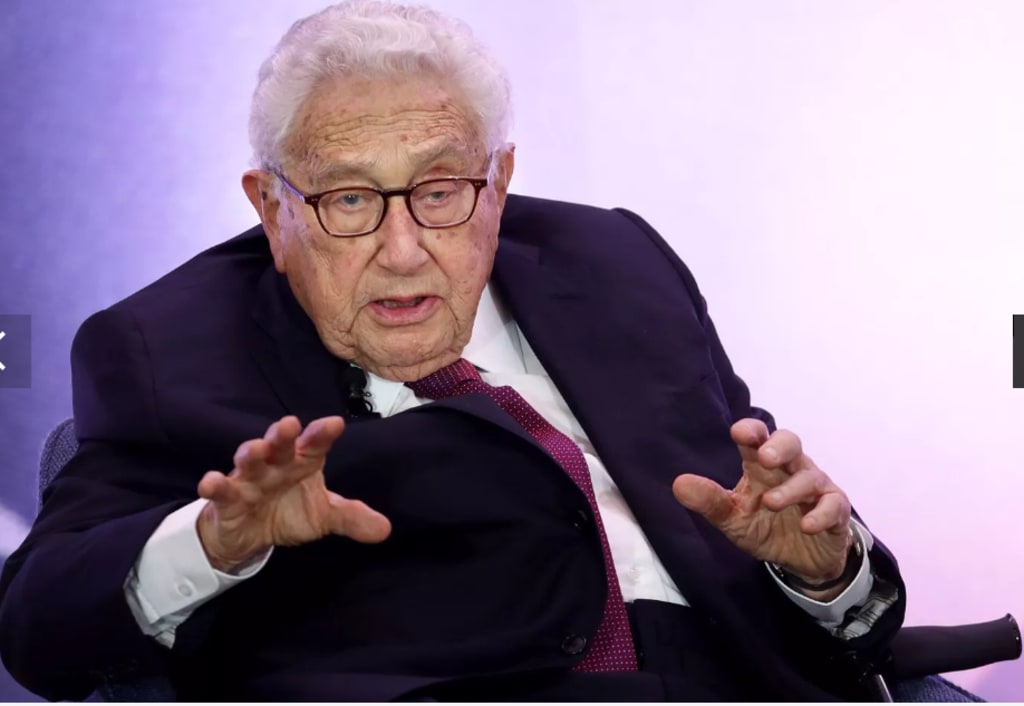At the age of 100, controversial former US Secretary of State Henry Kissinger passed away.
Henry Kissinger, a significant US diplomat, passed away at age 100.

Henry Kissinger, the former U.S. Secretary of State and political advisor who was lauded by some as a master statesman and branded by others as a glorified war criminal, has died aged 100.
Kissinger had been a central presence in U.S. and global political spheres for decades, having forged his name during the Cold War to establish himself as a deft statesman and a pragmatic political hawk.
Born Heinz Alfred Kissinger in the German city of Fürth on May 27, 1923, he became known as Henry after his family immigrated to the U.S. in 1938 to avoid the Nazi persecution of Jews. Like many fleeing Germany at the time, the Kissinger family settled in the New York neighborhood of Washington Heights.
He became an American citizen in 1943 and joined the American Army in time for World War II. He then went on to serve in the American military government in West Germany after the war.
After coming back to the United States, Kissinger went into academia. He studied at Harvard University, where he earned a political science BA in 1950 and an MA and PhD later. He continued to advance through the ranks of the esteemed institution, where from 1959 to 1969 he directed the Defence Studies Programme.
After the publication of his 1957 book Nuclear Weapons and Foreign Policy, in which he argued for greater adoption of nuclear weapons as a traditional means of conducting warfare and discredited the need to limit their use to emergency scenarios, Kissinger established himself as one of Washington, D.C.'s most influential political thinkers.
Kissinger gained rapid notoriety for his pragmatic and realistic approach to politics, and during the 1960s, he advised Republican presidential candidate Nelson Rockefeller on foreign policy matters.
He had the chance to mingle with the political elite of Washington and the inner ring of the Republican Party, and as a result, President Richard Nixon appointed him assistant for national security affairs in 1968.
Henry Kissinger is congratulated by President Richard Nixon in the White House East Room following his oath of office as Secretary of State on September 22, 1973. Kissinger rose to the position of senior diplomat in his nation, becoming the first American citizen of foreign birth.
As a result, Kissinger was able to gain more political clout and rank among Nixon's most reliable advisors.
Nixon was the leader when Kissinger peaked. After working as a national security advisor from 1969 to 1975, he was appointed Secretary of State in 1973 and remained in that position until 1977.
He had established himself as a key player in the Nixon administration and a major global influencer. In the 1970s, he worked particularly well with China, the Soviet Union, Vietnam, and the Middle East.
Kissinger was praised for his role in arranging improved relations between the United States and the Soviet Union between 1969 and 1974, which led to the Strategic Arms Limitation Talks (SALT) in 1969 and SALT I in 1972. Kissinger also orchestrated a series of covert trips to communicate with his Communist counterparts, which helped facilitate Nixon's historic trip to China in 1972.
In addition, Kissinger played a crucial role in bringing the Vietnam War to an end after nearly two decades of fighting. He achieved a permanent peace settlement and a cease-fire agreement in January 1973; for this work, he was granted the Nobel Peace Prize in the same year.
At a press conference held in Paris to announce the agreement, Kissinger stated:
"A healing peace is what the United States seeks. There have been numerous armistices in Vietnam. We firmly intend to transition our relationship with the Democratic Republic of Vietnam from one of hostility to normalization and then from normalization to conciliation and cooperation because we want lasting peace. Furthermore, we think that in Indochina at peace, we can help bring the humanitarian goals closer to reality.
Le Duc Tho, his Vietnamese counterpart, declined the award.
Throughout the 1970s, Winston Lord served as Kissinger's special assistant, closely collaborating with him in China and Vietnam.
"Kissinger has influenced my life the most, excluding my family. His insistence on excellence and strategic vision stretched my patience and nerves, but they also increased my capabilities and broadened my horizons. He will go down in post-World War II American diplomatic history as one of the greats."
The most important of these was the condemnation of planning the American bombing of Cambodia from 1969 to 1973 in an effort to destabilize the forces of Northern Vietnam.
An estimated 150,000 people were killed during the four years that Kissinger was involved in directing Operations Menu and Freedom Deal, which dropped a total of 539,129 tonnes of bombs on Cambodia.
Seymour Hersh, a journalist, said Kissinger "seemed to enjoy playing the bombardier." "When the military men presented a proposed bombing list, Kissinger would redesign the missions, shifting a dozen planes, perhaps, from one area to another, and altering the timing of the bombing runs," the author of The Price of Power: Kissinger in the Nixon White House, wrote.
Due to the bombing of Cambodia, which left the nation unstable and crippled, the Khmer Rouge came to power and went on to commit the genocide that claimed between 1.5 and 3 million lives.
According to a Pentagon report from 1973, Kissinger also went to considerable measures to prevent the plan from becoming known and even came up with "the methods for keeping them out of the newspapers."
In addition, Kissinger approved of Indonesia's 1975 invasion of East Timor, which claimed over 200,000 lives. And during the Bangladesh Genocide, his deeds—or rather, his inaction—caused bloodshed.
To quell the Bengali population's demands for independence, West Pakistan viciously attacked East Pakistan (present-day Bangladesh) in 1971.
Local American officials had accused the Nixon administration of "moral bankruptcy" for withdrawing from the conflict and had alerted the White House to the "selective genocide" that was occurring. Kissinger ignored the cautions and said that Pakistan was where the United States' interests lay, so he advised against interfering.
Christopher Hitchens asserted in his book The Trial of Henry Kissinger that "Kissinger was responsible for the killing of thousands of people."
Nicholas Thompson, CEO of The Atlantic and author of The Hawk and the Dove: Paul Nitze, George Kennan, and the History of the Cold War, stated the following in an interview with Politico in 2015:
"Among the worst individuals to ever be a force for good is Henry Kissinger. He played nations and colleagues. To further some bizarre personal game theory, he staged the start of a nuclear war. He committed international crimes with callousness.
"But he was an intellectual at the core of an American policy that eventually helped the entire world in a big way. One of America's greatest Cold War triumphs was his China policy. He deserves recognition and a medal, but one that features a picture of a knife-wielding, scowling man. Although Henry Kissinger achieved great success in America, he can only be regarded as an idealist if he is also regarded as reprehensible."
Kissinger also approved the CIA to support the military takeover of Chile in 1973, which resulted in the military assassination of democratically elected Marxist President Salvador Allende. General Augusto Pinochet replaced him and established a military dictatorship.
He supported the right-wing coup of the military junta in 1976, acting in a similar manner during Argentina's Dirty War. According to documents that were declassified at the beginning of the new century, Kissinger had advised the Argentine Armed Forces' leaders to move quickly to prevent a backlash in the United States.






Comments (1)
kissinger was not good